In This Story
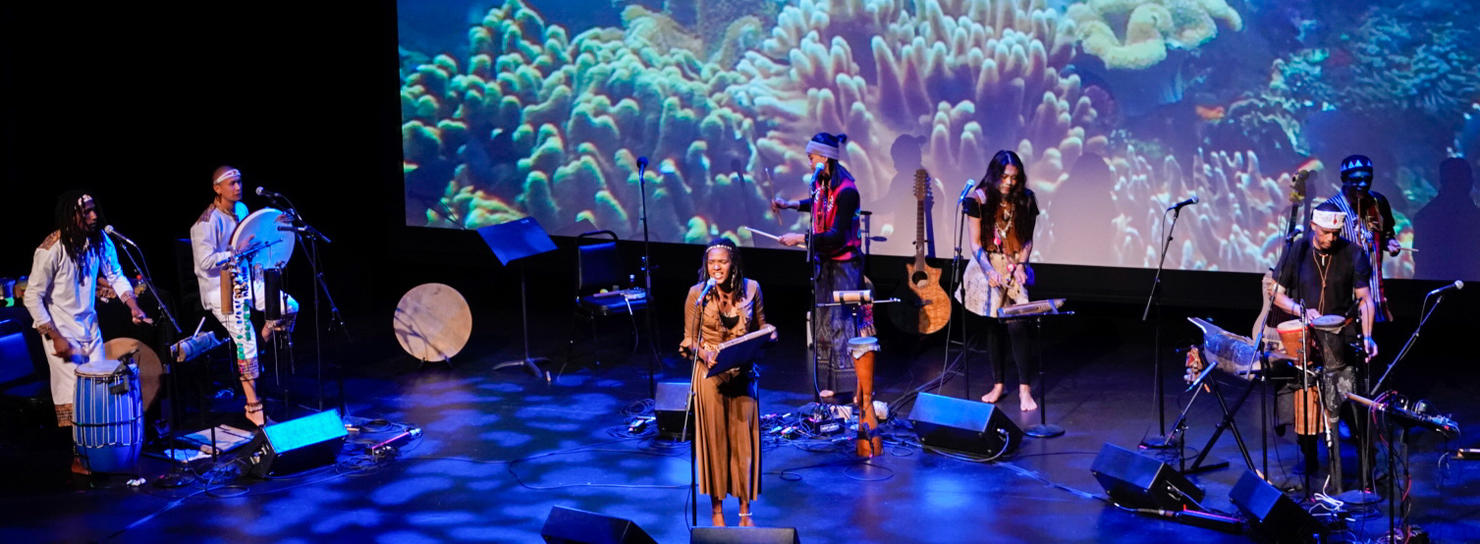
Right before Earth Day, Small Island Big Song (SIBS) presented an "impassioned" (Roots World) concert experience at the Center for the Arts on April 20, combining music, spoken word, and stunning projections of indigenous artists from Pacific and Indian Ocean island nations while shining a light on the devastating effects of the climate crisis on our world’s oceans.
After hearing the 5th Intergovernmental Panel on Climate Change (IPCC) report, Small Island Big Song Co-founders and husband-and-wife duo, BaoBao Chen and Tim Cole, quit their jobs and spent three years visiting artists and the artists’ homelands, sharing and building upon songs from island to island. The outcome includes two award-winning albums, a feature film, educational programs, and a live concert that has toured all over the world. Billboard describes Small Island Big Song as “one coherent jaw-dropping piece that is likely the first time these traditional instruments have been mixed together… The result is breathtaking.”
As a Mason Artist-in-Residence, Small Island Big Song also deeply engaged with the community through a series of education and engagement programs. Programming and Engagement Manager at the Center Vic Adebusola notes, “Small Island Big Song connected with academic classes, local nonprofits, and students from local K-12 schools in our community through demonstrations, panels, and arts activities. It was powerful to witness firsthand their ability to simultaneously shed light on the climate crisis of their artists’ Indigenous communities while building community through music, dance, and crafting. They are truly the full package!”
Meet the Participating Small Island Big Song Artists

BaoBao Chen (Taiwan) has produced and managed Small Island Big Song's two multimedia concert productions, two award-winning albums, documentary, as well as curating world tours across 18 countries in Europe, the USA, Asia, and Oceania. BaoBao is one of Taiwan’s most prominent producers of cross-cultural arts projects, an International Society for the Performing Arts fellow, and has been invited to speak at TEDx, WOMEX, APAP NYC, and Stanford Live. (Image courtesy of artist)
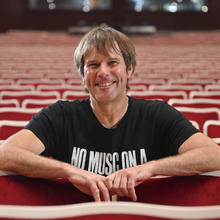
Tim Cole (Australia) is a music producer and filmmaker who’s produced numerous albums, films, and concerts for Australian aboriginal, Torres Strait islander and Pacifica artists including Archie Roach, Telek, and Shellie Morris. He was a senior music producer at CAAMA - Central Australian Aboriginal Media Association before beginning Small Island Big Song and has received a Churchill fellowship as well as invitations to speak at the United Nations HQ, APAP NYC, and WOMEX. (Image courtesy of artist)
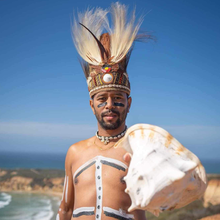
Sam Roem (Wamena heritage, West Papua and Indonesia) is an Australian- based performing artist from West Papua. In 2006 with 40 other West Papuans he crossed over 600 miles of open seas to seek political asylum in Australia, sparking a diplomatic crisis. After graduating from Australia’s Dance Academy Sam has pursued a dynamic career in the arts drawing on his unique Papuan heritage, performing at The Sydney Opera House, Womadelaide, and BluesFest Byron Bay. (Image courtesy of artist)
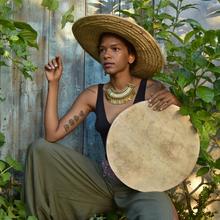
Emlyn (Creole heritage, Mauritius) is leading a wave of performers across the Indian Ocean proudly reclaiming their unique rhythms and cultural mix. Written with a reactive pen and sung in Mauritian Creole, Emlyn brings the grooves of Sega with the sounds of her traditional frame drum, Ravann, which originated from the rhythms of African/Madagascan people during the slave trade. SIBS has been collaborating with Emlyn since 2020. (Image courtesy of artist)
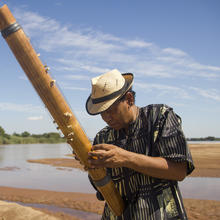
Sammy (Merina heritage, Madagascar) followed his passion for Madagascar’s musical heritage by mastering and learning how to make most of Madagascar’s instruments. His efforts came to the notice of the UK’s world music scene as his band Tarika Sammy gained international recognition, becoming a regular on major festival stages and being acknowledged as one of the world’s “Best Ten Bands,” alongside U2, by TIME Magazine. He’s featured in both SIBS albums and concert tours since 2018. (Image courtesy of artist)
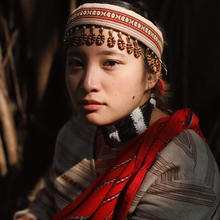
Yuma Pawang (Atayal heritage, Taiwan) is a multidisciplinary artist expressing her thoughts on "Atayal" cultural preservation, transformation, essence, and social equity in film, music, painting, and performance. With Taiwan’s respected Minang performance group, she was invited by Indigenous nations of Northern Europe for a cultural exchange. This experience along with studying film performance made her aware of the significance of cultural practice in the context of Atayal life, where written language was historically limited. (Image courtesy of artist)
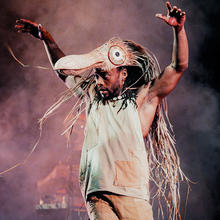
Mathieu Joseph (Creole heritage, Mauritius) has been a professional dancer and choreographer since the age of 14 when he was discovered breakdancing on the suburban streets of Port Louis, Mauritius by renowned choreographer Stephen Bongarçon. Quickly embedding himself in Bongarçon’s SRDance, he won the gold medal for dance at "Les Jeux de la Francophonie'' in 2009. This led to a succession of shows and companies, including choreographing "Di Sel,” a tribute to the salt workers of Mauritius which won the "Les Jeux de la Francophonie” in 2017. (Image courtesy of artist)
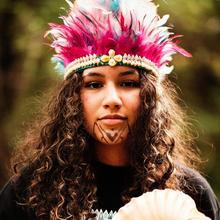
Mea Joy Ingram (Motu heritage, Papua New Guinea and Australia) comes from a long line of drummers and dancers. She was taught by her father, master percussionist Airileke Ingram in the tradition of Manus Garamut, Cook Island Pate, and Gabagaba Motu Mavaru. The Garamut drumming of Papua New Guinea was traditionally an artform dominated by men, however Mea, having just turned 18, represents the new generation of female log drummers. (Image courtesy of artist)
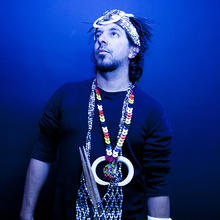
Airileke Ingram (Motu heritage, Papua New Guinea) is a percussionist, producer, composer, activist, and, in the words of Britain's Songlines Magazine, "cause for celebration." Airileke is a master drummer with one foot in the world of traditional drumming of Melanesia and his other in the modern world of beat production and hip-hop. Tim and Airileke have been long-time collaborators; they met up again during SIBS’s field trip to Papua New Guinea in 2016. (Image courtesy of artist)
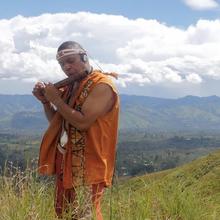
Richard Mogu (Magi, Papua New Guinea)—singer, songwriter, and multi-instrumentalist—has spent many years as a solo artist and session musician, excelling in both traditional and contemporary style. While bass is his featured instrument, he is also adept at mambu (bamboo flutes), garamut drumming, guitars, and percussion. Mogu has also been involved as a producer of other PNG artists and toured internationally in the London Olympic cultural festival and in the U.S. as well as Australia. (Image courtesy of artist)
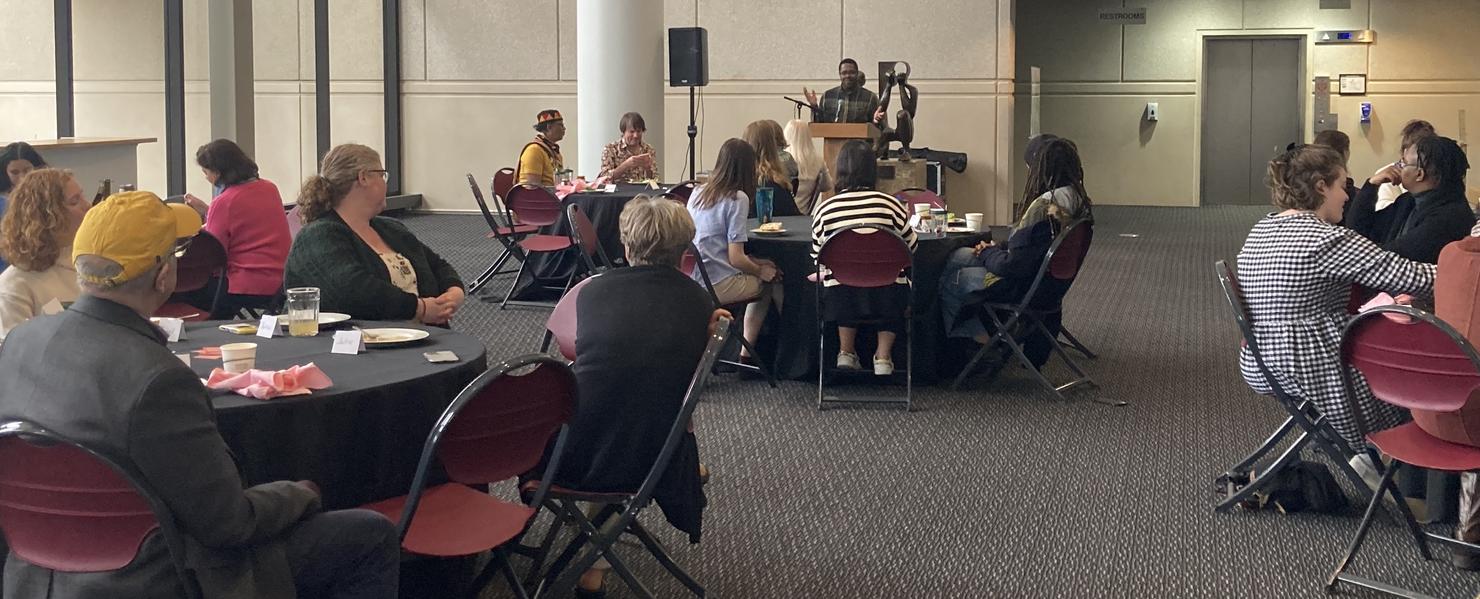
Small Island Big Song artists and Center for the Arts staff enjoy a welcome lunch together.
The residency’s activities commenced with an April 2 potluck lunch with Center for the Arts staff and guests from across campus, including Mason Dining Marketing and Sustainability Manager Sophia Nelson, to welcome artists of Small Island Big Song. The lunch included sustainable practices such as the use of reusable/compostable plates and cutlery, take-home containers, and local ingredients. SIBS co-founder BaoBao Chen explained at the welcome luncheon that creating community through the arts, similar to Mason Arts’ mission, was a goal of Small Island Big Song and its hope to take audiences to some places that “we might not have the courage of going alone, to celebrate, to confront, to inspire, to mourn, to feel hopeful.” During the event, members of the ensemble were presented with welcome gifts, including Mason merchandise and honey harvested by Mason’s own The Honey Bee Initiative, a program supported by George Mason University’s School of Business and operated by the Business for a Better World Center.
-Adrienne Bryant Godwin, College of Visual and Performing Arts Director of Programming
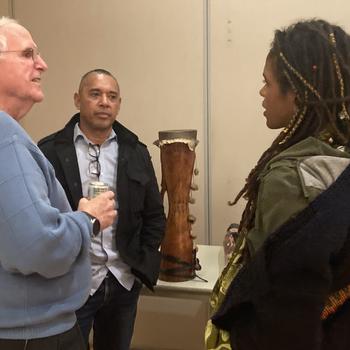
Later that day, SIBS artists Sammy, Yuma, Mathieu, and Co-founder Tim Cole visited Mason’s Dewberry School of Music program’s “Music History in Society III” course taught by Professor Gregory Robinson. With over 20 students, the artists led a discussion that shared traditional string instruments like the valiha, jejy, and kabosy; drums such as the kundu and garamut; and rhymes, songs, and stories. In the evening, Small Island Big Song hosted a Friends of the Center for the Arts Artists in Conversation event, Our Shared Seafaring Heritage, Alive in Rhythm and Song, at the Stacey C. Sherwood Community Center in Fairfax, VA. Co-presented by the City of Fairfax and Center for the Arts, SIBS artists— Emlyn, Richard, Mea Joy, BaoBao, and Tim— led a lecture-demonstration that provided geographical and historical background about the great oceanic migrations that affected the featured island nations of the project. The event included musical demonstrations and an interactive Q&A.
In a Dancing Mauritian Sega workshop the following day, approximately 100 grade school students from Hunters Woods Elementary School were invited to learn the Sega dance from Mauritius, led by Mathieu Joseph and Sam Roem, who also provided drumming accompaniment. Both the national dance of Mauritius and a profound artistic embodiment of the historical and cultural memory of colonial slavery, Sega is a testament to the strength of the human spirit and the capacity to create and express beauty out of nothing.
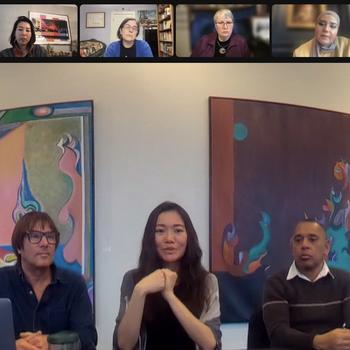
Small Island Big Song artists and co-founders BaoBao Chen and Tim Cole led a virtual discussion on the topic of “Artivism in Action - Managing Cultural Initiatives” with more than 20 students of Mason’s Arts Management and Folklore programs’ “Folklore and Festival Management” course, a collaboration with the Smithsonian Folklife Festival.
Director of Mason’s Arts Management program and co-professor of the course, Dr. Karalee Dawn Mackay, notes, "Being able to hear about how their projects were funded, created, their goals for the performances, and the multi-dimensional aspect of their work were an invaluable experience for our students as they explore how to work with and create programming with cultural tradition bearers. Our students were able to ask questions that greatly enhanced their understanding of this project and how it impacts the Pacific Island communities, the artists, and the audiences that they share their work with through their documentary and concert performances."
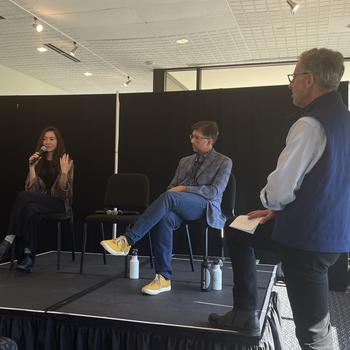
On April 18, BaoBao Chen joined Mark Cooley, Mason School of Art faculty and Green Studio founder, for a special discussion entitled Climate Change: Our Response as Artivists. Co-presented with the Inclusive Collaborative Arts at Mason (ICAM) project and moderated by Distinguished Professor at George Mason University and Director of Mason’s Center for Climate Change Communication Edward Maibach, the conversation explored ways in which artists can use their voices to expand global conversation on political, economic, social, and cultural questions at the root of the climate crisis.
The following day, Small Island Big Song hosted a schooltime matinee performance for more than 800 local students, teachers, and parents. In a specialized, shortened version of the April 20 performance, SIBS artists brought students to their feet to dance and sing along with unique oceanic grooves and soulful island ballads. Adebusola recalls the meaningful interactions between the audience and SIBS, stating, “I don’t think I’ve ever heard this much excitement, laughter, and singing in our Concert Hall. The visiting students were enthralled with Small Island Big Song’s music and dance—likewise, the Small Island Big Song artists left the stage beaming with joy. It was truly an equal exchange of positive energy.”
Later that afternoon, Emlyn led a cooking demonstration at Ike’s Dining Hall, presented in partnership with Mason Dining. With assistance from BaoBao and Tim, as well as musical accompaniment from Sammy and Mathieu, Emlyn created a traditional island dish, fish curry, for the assembled Mason students and community members.
On the morning of April 20, SIBS artists Sammy led a “Trash to Music” workshop with the help of Richard, Yuma, and Nini, the ensemble’s company manager. Hosted by UpCycle Creative Reuse Center, the hands-on workshop demonstrated how to make musical instruments from trash, commonly recycled, and/or reused materials. Participants made a Malagasy-style berimbau, trying them out alongside the artists. Watch the video below to see SIBS’ Sammy play a berimbau in the first moments of the video:
That evening, audience members at Small Island Big Song’s culminating concert at the Center for the Arts, One Island, were treated to a plethora of pre- and post-show experiences including a performance from Mason’s Healing Arts Ensemble in the lobby. The ensemble is improvisatory in nature and includes unconventional, as well as common, instruments and voice. Led by Director Rita Gigliotti, students played instruments such as crystal quartz singing bowls, handbells, gong, and Tibetan flute.
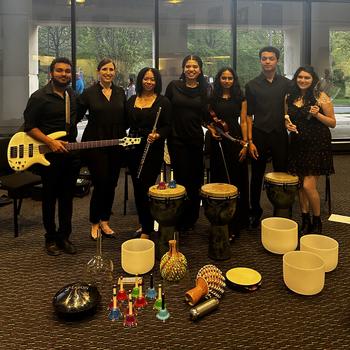
In Monson Grand Tier, BaoBao Chen and Tim Cole joined a pre-performance discussion moderated by Associate Professor and Director of Graduate Studies and Ethnomusicology for Mason’s Dewberry School of Music, Dr. Gregory Robinson. Prior to the performance, Vice President of Mason’s Native American and Indigenous Alliance (NAIA), Sara Jefferson, delivered a land acknowledgement from the stage. Small Island Big Song strives to amplify the voices of indigenous communities so by having local representation at the performance, SIBS continued to apply its mission to retain and recognize indigenous culture. After the Small Island Big Song performance, SIBS artists greeted the audience in the Center’s lobby, signing CDs and sharing handmade items from their respective islands.
Small Island Big Song touched the lives of Mason and its local community, proving that there truly is “one island” we all share. Adebusola elaborates, “It is very clear to me that Small Island Big Song prioritizes making an impact in the communities they visit. Every participant who interacted with them left the engagement or performance with a smile on their face. They use the arts to create community and inspire hope to address climate change--they are the real deal!”
This engagement of Small Island Big Song is made possible through the ArtsCONNECT program of Mid Atlantic Arts with support from the National Endowment for the Arts.
The Mason Artist-in-Residence program is supported in part by the Wendy Frieman and David Johnson Fund.
The Small Island Big Song residency is supported in part by Eloise Stinger.
Thank you to the City of Fairfax Parks and Recreation Everybody Plays Grant program for making free tickets possible for the schooltime matinee program. This grant was funded by the American Rescue Plan Act (ARPA).
